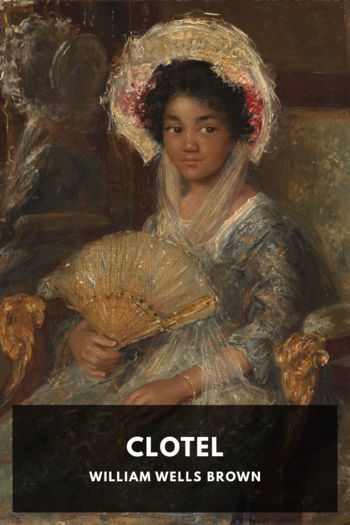Clotel, William Wells Brown [i like reading books .txt] 📗

- Author: William Wells Brown
Book online «Clotel, William Wells Brown [i like reading books .txt] 📗». Author William Wells Brown
Missing this, the bull turned to the “about face,” and the bear caught him by the ham, inflicting a ghastly wound. But Attakapas with a kick shook him off, and renewing the attack, went at him again, head on and with a rush. This time he was not so fortunate, for the bear caught him above the eye, burying his fangs in the tough hide, and holding him as in a vice. It was now the bull’s turn to “sing out,” and he did it, bellowing forth with a voice more hideous than that of all the bulls of Bashan. Some minutes stood matters thus, and the cries of the bull, mingled with the hoarse growls of the bear, made hideous music, fit only for a dance of devils. Then came a pause (the bear having relinquished his hold), and for a few minutes it was doubtful whether the fun was not up. But the magic wand of the keeper (the ten foot pole) again stirred up bruin, and at it they went, and with a rush.
Bruin now tried to fasten on the bull’s back, and drove his tusks in him in several places, making the red blood flow like wine from the vats of Luna. But Attakapas was pluck to the back bone, and, catching bruin on the tips of his horns, shuffled him up right merrily, making the fur fly like feathers in a gale of wind. Bruin cried “Nuff” (in bear language), but the bull followed up his advantage, and, making one furious plunge full at the figure head of the enemy, struck a horn into his eye, burying it there, and dashing the tender organ into darkness and atoms. Blood followed the blow, and poor bruin, blinded, bleeding, and in mortal agony, turned with a howl to leave, but Attakapas caught him in the retreat, and rolled him over like a ball. Over and over again this rolling over was enacted, and finally, after more than an hour, bruin curled himself up on his back, bruised, bloody, and dead beat. The thing was up with California, and Attakapas was declared the victor amidst the applause of the multitude that made the heavens ring.
“There,” said he, “can you find anything against Connecticut equal to that?” The Southerner had to admit that he was beat by the Yankee. During all this time, it must not be supposed that the old gent with the two daughters, and even the young ladies themselves, had been silent. Clotel and they had not only given their opinions as regarded the merits of the discussion, but that sly glance of the eye, which is ever given where the young of both sexes meet, had been freely at work. The American ladies are rather partial to foreigners, and Clotel had the appearance of a fine Italian. The old gentleman was now near his home, and a whisper from the eldest daughter, who was unmarried but marriageable, induced him to extend to “Mr. Johnson” an invitation to stop and spend a week with the young ladies at their family residence. Clotel excused herself upon various grounds, and at last, to cut short the matter, promised that she would pay them a visit on her return. The arrival of the coach at Lynchburgh separated the young ladies from the Italian gent, and the coach again resumed its journey.
XXIII Truth Stranger Than FictionIs the poor privilege to turn the key
Upon the captive, freedom? He’s as far
From the enjoyment of the earth and air
Who watches o’er the chains, as they who wear.
During certain seasons of the year, all tropical climates are subject to epidemics of a most destructive nature. The inhabitants of New Orleans look with as much certainty for the appearance of the yellow-fever, smallpox, or cholera in the hot season, as the Londoner does for fog in the month of November. In the summer of 1831, the people of New Orleans were visited with one of these epidemics. It appeared in a form unusually repulsive and deadly. It seized persons who were in health, without any premonition. Sometimes death was the immediate consequence. The disorder began in the brain, by an oppressive pain accompanied or followed by fever. The patient was devoured with burning thirst. The stomach, distracted by pains, in vain sought relief in efforts to disburden itself. Fiery veins streaked the eye; the face was inflamed, and dyed of a dark dull red colour; the ears from time to time rang painfully. Now mucous secretions surcharged the tongue, and took away the power of speech; now the sick one spoke, but in speaking had a foresight of death. When the violence of the disease approached the heart, the gums were blackened. The sleep, broken, troubled by convulsions, or by frightful visions, was worse than the waking hours; and when the reason sank under a delirium which had its seat in the brain, repose utterly forsook the patient’s couch. The progress of the heat within was marked by yellowish spots, which spread over the surface of the body. If, then, a happy crisis came not, all hope was gone. Soon the breath infected the air with a fetid odour, the lips were glazed, despair painted itself in the eyes, and sobs, with long intervals of silence, formed the only language. From each side of





Comments (0)